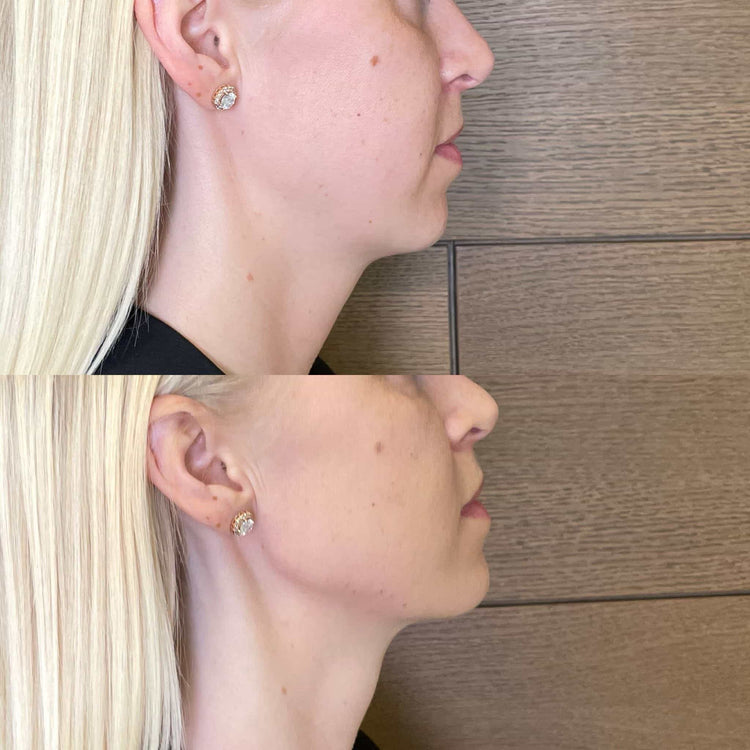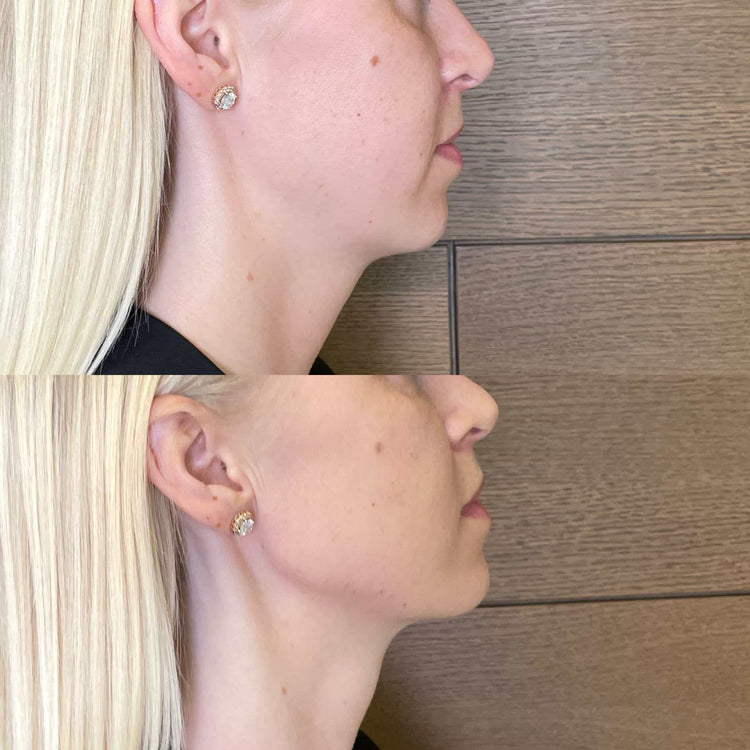Understanding Jaw Filler Safety
Jaw fillers have become increasingly popular for reshaping and contouring facial features, but questions arise regarding their safety, especially for individuals with sensitive skin.
Composition of Jaw Fillers
Understanding the composition of jaw fillers is crucial when considering their safety, particularly for those with sensitive skin. Jaw fillers primarily consist of hyaluronic acid (HA), a naturally occurring substance in the body that provides hydration and volume to tissues. HA-based fillers are generally considered safe due to their biocompatibility and reversible nature.

However, some individuals may experience mild side effects such as redness, swelling, or itching after treatment. People with sensitive skin might be more susceptible to these reactions. It’s essential to consult a qualified medical professional who can assess your skin type and health history to determine if jaw fillers are suitable for you.
Common Ingredients and Potential Allergic Reactions
Jaw fillers have become increasingly popular for reshaping and contouring facial features, but questions arise regarding their safety, especially for individuals with sensitive skin.
Understanding the composition of jaw fillers is crucial when considering their safety, particularly for those with sensitive skin. Jaw fillers primarily consist of hyaluronic acid (HA), a naturally occurring substance in the body that provides hydration and volume to tissues. HA-based fillers are generally considered safe due to their biocompatibility and reversible nature.
However, some individuals may experience mild side effects such as redness, swelling, or itching after treatment. People with sensitive skin might be more susceptible to these reactions. It’s essential to consult a qualified medical professional who can assess your skin type and health history to determine if jaw fillers are suitable for you.
Potential Risks for Sensitive Skin
Individuals with sensitive skin may experience heightened reactions to certain cosmetic procedures.
Inflammation and Sensitivity
Individuals with sensitive skin may experience heightened reactions to certain cosmetic procedures.
- Redness and swelling are common side effects of jaw fillers and can be more pronounced in individuals with sensitive skin.
- Itching or irritation may also occur, potentially lasting longer for those with heightened sensitivities.
- Allergic reactions to the filler material, although rare, are a possibility and should always be taken seriously.
Allergic Reactions to Fillers
Individuals with sensitive skin may experience heightened reactions to certain cosmetic procedures.
Redness and swelling are common side effects of jaw fillers and can be more pronounced in individuals with sensitive skin.

Itching or irritation may also occur, potentially lasting longer for those with heightened sensitivities.
Allergic reactions to the filler material, although rare, are a possibility and should always be taken seriously.
Minimizing Risks with Careful Selection and Administration
When considering cosmetic procedures, individuals with sensitive skin need to exercise extra caution. While jaw fillers offer the potential for facial contouring and reshaping, they can trigger heightened reactions in those prone to sensitivities.
Choosing the Right Filler Material
Minimizing risks associated with jaw fillers, especially for individuals with sensitive skin, involves careful selection of the filler material and administration by a qualified professional.
Choosing the right filler material is crucial. Hyaluronic acid (HA)-based fillers are generally considered safe due to their biocompatibility and reversible nature.
HA is a naturally occurring substance in the body, making it less likely to trigger adverse reactions.
However, some individuals may still experience mild side effects such as redness, swelling, or itching. For those with sensitive skin, it’s important to discuss these potential reactions with a doctor and explore alternative filler options if necessary.
Consultation and Patch Testing
Minimizing risks associated with jaw fillers, especially for individuals with sensitive skin, involves careful selection of the filler material and administration by a qualified professional.
Choosing the right filler material is crucial. Hyaluronic acid (HA)-based fillers are generally considered safe due to their biocompatibility and reversible nature. HA is a naturally occurring substance in the body, making it less likely to trigger adverse reactions.
However, some individuals may still experience mild side effects such as redness, swelling, or itching. For those with sensitive skin, it’s important to discuss these potential reactions with a doctor and explore alternative filler options if necessary.
Consultation with a qualified medical professional is essential. They can assess your skin type, health history, and any existing allergies to determine the most suitable filler and administer it safely.
Patch testing can be helpful for individuals with sensitive skin. This involves applying a small amount of the filler material to a discreet area of skin, such as the inner arm, to observe any reactions before proceeding with the full treatment.
Experienced Injector Expertise
Minimizing risks associated with jaw fillers, especially for individuals with sensitive skin, involves careful selection of the filler material and administration by a qualified professional.
Choosing the right filler material is crucial. Hyaluronic acid (HA)-based fillers are generally considered safe due to their biocompatibility and reversible nature. HA is a naturally occurring substance in the body, making it less likely to trigger adverse reactions.
However, some individuals may still experience mild side effects such as redness, swelling, or itching. For those with sensitive skin, it’s important to discuss these potential reactions with a doctor and explore alternative filler options if necessary.
Consultation with a qualified medical professional is essential. They can assess your skin type, health history, and any existing allergies to determine the most suitable filler and administer it safely.
Patch testing can be helpful for individuals with sensitive skin. This involves applying a small amount of the filler material to a discreet area of skin, such as the inner arm, to observe any reactions before proceeding with the full treatment.
Recovery and Aftercare for Sensitive Skin
Individuals considering jaw fillers should understand potential risks and benefits, particularly those with sensitive skin.
Jaw fillers, while generally safe, can cause side effects like redness, swelling, and itching, which may be more pronounced in individuals with sensitive skin.
Managing Discomfort and Swelling
Recovery after jaw filler treatment typically involves managing discomfort and swelling. Applying a cold compress to the treated area can help reduce inflammation and minimize bruising. Over-the-counter pain relievers like ibuprofen or acetaminophen can alleviate any discomfort.
It’s important to avoid touching or rubbing the treated area as this can irritate the skin and potentially delay healing. Following your practitioner’s post-treatment instructions carefully is crucial for optimal recovery.
Product-Specific Instructions
Individuals with sensitive skin may experience heightened reactions to certain cosmetic procedures.
Redness and swelling are common side effects of jaw fillers and can be more pronounced in individuals with sensitive skin. Itching or irritation may also occur, potentially lasting longer for those with heightened sensitivities. Allergic reactions to the filler material, although rare, are a possibility and should always be taken seriously. When considering cosmetic procedures, individuals with sensitive skin need to exercise extra caution. While jaw fillers offer the potential for facial contouring and reshaping, they can trigger heightened reactions in those prone to sensitivities.
Minimizing risks associated with jaw fillers, especially for individuals with sensitive skin, involves careful selection of the filler material and administration by a qualified professional. Choosing the right filler material is crucial. Hyaluronic acid (HA)-based fillers are generally considered safe due to their biocompatibility and reversible nature. HA is a naturally occurring substance in the body, making it less likely to trigger adverse reactions. However, some individuals may still experience mild side effects such as redness, swelling, or itching. For those with sensitive skin, it’s important to discuss these potential reactions with a doctor and explore alternative filler options if necessary. Consultation with a qualified medical professional is essential. They can assess your skin type, health history, and any existing allergies to determine the most suitable filler and administer it safely. Patch testing can be helpful for individuals with sensitive skin. This involves applying a small amount of the filler material to a discreet area of skin, such as the inner arm, to observe any reactions before proceeding with the full treatment.
Recovery after jaw filler treatment typically involves managing discomfort and swelling. Applying a cold compress to the treated area can help reduce inflammation and minimize bruising. Over-the-counter pain relievers like ibuprofen or acetaminophen can alleviate any discomfort. It’s important to avoid touching or rubbing the treated area as this can irritate the skin and potentially delay healing. Following your practitioner’s post-treatment instructions carefully is crucial for optimal recovery.
Individuals considering jaw fillers should understand potential risks and benefits, particularly those with sensitive skin. Jaw fillers, while generally safe, can cause side effects like redness, swelling, and itching, which may be more pronounced in individuals with sensitive skin.
Define your jawline and profile with jaw fillers from Dr. Laura Geige at It’s Me & You Clinic
- Labiomental Crease Filler – Chin Crease Treatment Near Dockenfield, Surrey - May 6, 2025
- Anti-Wrinkle Treatments Near Redhill, Surrey - May 6, 2025
- Exosome Therapy For Skin Rejuvenation Near Headley, Surrey - May 6, 2025

